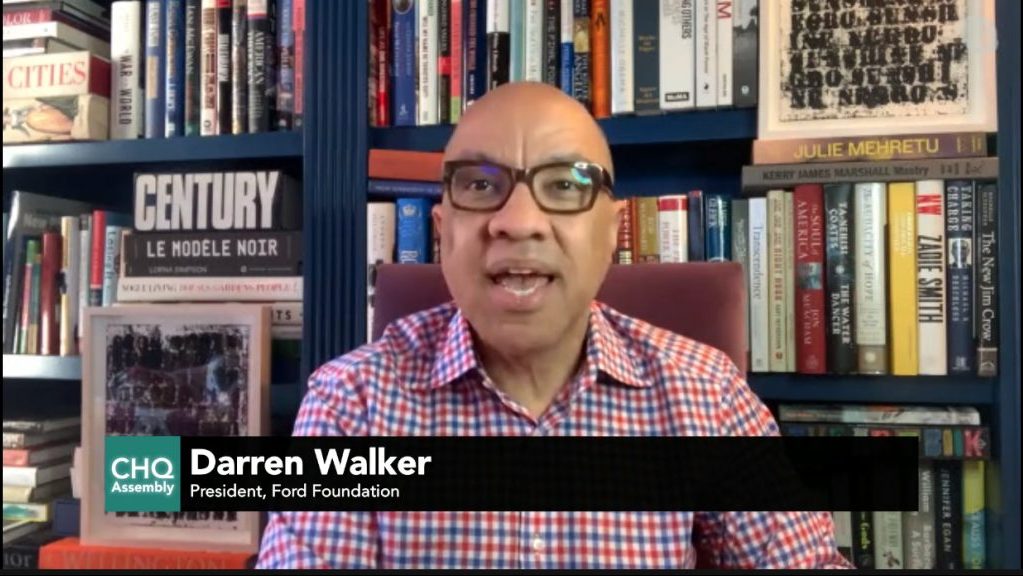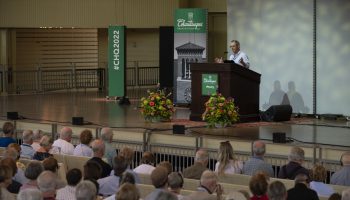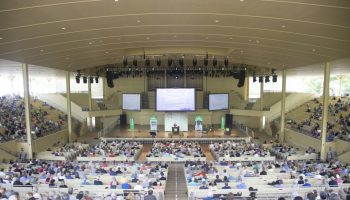Art may seem useless when society itself is going through great change, especially in the midst of a worldwide pandemic that has killed 138,000 Americans, and people are marching through the streets to protest systemic racism that has killed countless Black men, women and children.
But Darren Walker, president of the Ford Foundation, said during this time of “extraordinary inequality, where everything is seen through the lens of capital, and what is valued correlates with capital,” art reminds people what really matters. Art often helps people find words and imagery that match experiences.
“I noticed from my own experience when I lost my David (Beitzel, Walker’s partner of 26 years), I was so grief stricken. I couldn’t actually fully articulate what I was going through,” Walker said. “And I found through certain words that are in poems, or looking at his favorite Joan Mitchell and Hans Hoffman paintings, I found him, and I found ways of coping with my grief.”
Walker said that there is a dialogue with many forms of art. In theater, there is a dialogue in vignettes, when traditions from the past are grounded in the present and, he said, “that dialogue that happens between the person sitting in the seat and what’s going on the stage.”
“I was literally just lamenting the fact that the Nutcracker is not going to be on stage at New York Koch Theater this winter. I look forward to that dialogue,” Walker said.
Art also reminds people of the past.
“I remember the first time I saw Merrill Ashley come out as the Sugar Plum Fairy,” Walker said. “And now there’s some new principal of the dancer, Tyler (Angle) who I don’t really know, but I’m in a dialogue with Tyler and Merrill Ashley about the Sugar Plum Fairy, and what it all means.”
Walker talked on Tuesday, July 14, on CHQ Assembly, with Chautauqua Institution President Michael E. Hill. The conversation, titled “Arts and Social Justice” was the second presentation of Week Three’s theme of “Art and Democracy”
What we learn from those experiences (with the arts) is empathy. We develop the empathy muscle that allows us to see the humanity in other people,” Walker said, “to put ourselves in their shoes, to imagine what it must be like to be marginalized, dispossessed, disrespected and disregarded — which often too many people in our society are and that is why there is so much injustice.”
Walker grew up in Ames, Texas, and in 1965, a woman walked around the neighborhood asking if families would enroll their children in a new government program called Headstart. He joined the inaugural class of Headstart, which developed a love of reading and encouraged curiosity within him.
“I think the art for me, initially, was something that felt remote. I first remember going with my grandmother, who was a domestic for a wealthy family in Houston, to clean their house,” Walker said. “They threw away programs from events they attended. Cultural activities. And then, I remember just taking some of those.”
Walker said he was lucky to attend the University of Texas in Austin, which had a “fantastic cultural program.” He saw the Dance Theater of Harlem in 1980, as well as many Broadway road shows.
“I just saw my life change because of the arts in so many ways,” Walker said.
Hill asked how Walker went from getting a law degree to working in philanthropy at the Ford Foundation.
Walker said he did not know what philanthropy was until he received a scholarship to go to school from a wealthy Texas oilman. He was hired as COO of the Community Development Organization of the Abyssinian Baptist Church, where one of the funders gave his name to the president of the Rockefeller Foundation. A few weeks later, Walker was hired as the director of the U.S. program of the Rockefeller Foundation.
“Going from Harlem, from a basement office on 138th Street where we literally counted every penny,” Walker said, “(to) where, when you went to Washington, you took the $2 bus, not the Amtrak, to Rockefeller was a very different world, to say the least.”
Walker found that he could help people in this career.
“I never wanted a career in philanthropy. I still don’t want a career in philanthropy. I found that philanthropy could be a place for someone who wanted to work on social justice,” Walker said.
Walker takes the most joy with working with the arts, which he believes are an essential part of a just society. He said that we “can’t have justice without the arts.”
“What we learn from those experiences (with the arts) is empathy. We develop the empathy muscle that allows us to see the humanity in other people,” Walker said, “to put ourselves in their shoes, to imagine what it must be like to be marginalized, dispossessed, disrespected and disregarded — which often too many people in our society are and that is why there is so much injustice.”
Walker said society has to become more empathetic to solve injustices like mass incarceration. This includes empathy in leadership.
“I hear the words that leaders use to describe other human beings. I look at those leaders and I say, ‘This is a person who has clearly never read poetry, has clearly not had that empathy muscle developed,’” Walker said. “(That muscle) is only developed through the experience of the arts and humanities.”
Hill then asked about Walker’s book, From Generosity to Justice: A New Gospel of Wealth — specifically why he chose to include this quote by Martin Luther King, Jr.: “Philanthropy is commendable, but should not allow the philanthropists to overlook the economic injustice that makes philanthropy possible.”
Walker said that in the U.S. it has been important for wealthy people to be charitable and to feel good about giving back.
“And I still believe that that imperative is important, but it’s no longer enough. Philanthropy cannot solve the challenges we see facing our society today,” Walker said.
Walker said that wealthy people, including himself, will have to ask what they are willing to give up, rather than give back. This conversation will be difficult because, Walker said, many Americans, particularly successful ones, believe that the U.S. is a meritocracy, meaning power in society is based on personal ability. There are policies in place, he said, that push some people forward and hold others back — such as tax systems and legacy admissions to colleges.
“I think all of us, from where we sit, are going to have to get uncomfortable to see real progress in America,” Walker said.
Hill asked if the U.S. is ready to be uncomfortable.
Walker thinks that more people are ready, but is not sure that society as a whole is. From his conversation with CEOs, philanthropists and other foundations, he has seen that people are engaging in different kinds of conversation.
“Part of the reason the ball can be moved farther down the field now is because, for 400 years in this country, racism has been denied,” Walker said. “There was always deniability as an option for white people.”
I believe we as a people are willing to hear things that are difficult and uncomfortable, and that are antithetical to our professed values and our romanticized narrative of who we are as a people,” Walker said. “I think we’re in a different position and that’s one of the reasons I’m hopeful.”
The hearts of centuries of African Americans have been broken in America, Walker said, but now more white Americans are anguished, depressed and heartbroken by that racism, too.
“Now we’re able to experience the heartbreak together, of what racism can do to a society,” Walker said.
Walker said George Floyd’s death and the deaths of other Black people by police has made denying racism no longer an option.
“I believe we as a people are willing to hear things that are difficult and uncomfortable, and that are antithetical to our professed values and our romanticized narrative of who we are as a people,” Walker said. “I think we’re in a different position and that’s one of the reasons I’m hopeful.”
Hill’s last question was what everyday citizens should do “in the midst of this changing democracy we find ourselves in.”
“The thing that we need today is compassion, is love, is grace. This is what will get us through this moment. (But) only if each of us commits in our own lives, to live by those values, and to show love, compassion, and grace to others,” Walker said. “Can we imagine a better world? That’s what I hope for all of us. And that’s what the arts can help us to do.”





